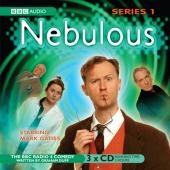Blue Jam was an ambient, surreal dark comedy and horror radio programme created and directed by Chris Morris. It was broadcast on BBC Radio 1 in the early hours of the morning, for three series from 1997 to 1999.

Flower Pot Men is a British programme for young children produced by BBC Television. It was first transmitted in 1952, and repeated regularly for more than twenty years. A remake of the programme called Bill and Ben was aired in 2001.
I'm Sorry, I'll Read That Again was a BBC radio comedy programme that was developed from the 1964 Cambridge University Footlights revue, Cambridge Circus., as a scripted sketch show. It had a devoted youth following, with the live tapings enjoying very lively audiences, particularly when familiar themes and characters were repeated; a tradition that continued into the spinoff show I'm Sorry I Haven't a Clue.
BBC Radio 4 Extra is a British digital radio station owned and operated by the BBC. The sister station of BBC Radio 4, it mostly broadcasts archived repeats of comedy, drama and documentary programmes. It is the principal broadcaster of the BBC's spoken-word archive, and as a result the majority of its programming originates from that archive. It also broadcasts extended and companion programmes to those broadcast on Radio 4, and provides a "catch-up" service for certain programmes.

Nebulous is a post-apocalyptic science fiction comedy radio show written by Graham Duff and produced by Ted Dowd from Baby Cow Productions; it is directed by Nicholas Briggs. The series premiered in the United Kingdom on BBC Radio 4. Set in the year 2099 AD, the show focuses on the adventures of the eponymous Professor Nebulous, director of operations for the eco-troubleshooting team KENT (the Key Environmental Non-Judgmental Taskforce) as they combat various catastrophes and try to set the world back on the right path following a worldwide environmental disaster known as "The Withering". As well as being a parody of a number of famous science fiction programmes, including Doctor Who, Quatermass and Doomwatch, Nebulous is considered a cult radio programme, attracting a number of guest appearances from famous actors.
Belinda Lucy Lange Fraser, known professionally as Belinda Lang, is an English actress. She is known for playing Liza in the ITV sitcom Second Thoughts (1991–94), and Bill Porter in the BBC sitcom 2point4 Children (1991–99). Her theatre credits include London productions of the Noël Coward plays, Present Laughter (1981), Blithe Spirit (1997), and Hay Fever (2006). Her radio/audio credits include voicing narrator Madeleine in the podcast Wooden Overcoats.
The Roly Mo Show is a British children's television series produced by Novel Entertainment and aired on CBeebies. The series is set in the home of Roly Mo, where his niece and his friends come over each day to visit him. It is an educational series, with a primary focus on literature. It is a spin-off of Fimbles.

Watch with Mother was a cycle of children's programmes created by Freda Lingstrom and Maria Bird. Broadcast by BBC Television from 1952 until 1975, it was the first BBC television series aimed specifically at pre-school children, a development of BBC radio's equivalent Listen with Mother, which had begun two years earlier. In accordance with its intended target audience of pre-school children viewing with their mothers, Watch with Mother was initially broadcast between 3:45 pm and 4:00 pm, post-afternoon nap and before the older children came home from school.
"New Earth" is the first episode of the second series of the British science fiction television series Doctor Who. It was first broadcast on BBC One on 15 April 2006.
Daphne Margaret du Grivel Oxenford was an English actress, known for her early stage roles, and later her radio and television work. She was the voice of BBC radio's Listen with Mother from its inception in 1950 to 1971. As spinster Esther Hayes, she was part of the original cast of Coronation Street. Other notable roles include Mrs Plummer in Man About the House (1973), Alice Dutton in EastEnders (1990), and Mrs. Oldknow in the mini-series The Children of Green Knowe (1986).
Eileen Browne, was a BBC Radio broadcaster, perhaps best known for being one of the original presenters of Listen with Mother.
Eileen Browne may refer to:
This is a list of events from British radio in 1966.
This is a list of events from British radio in 1965.
This is a list of events from British radio in 1964.
Are You Sitting Comfortably? may refer to:

Julia Lang was a British film and radio actress and radio presenter. Born in London, she is best known for presenting the BBC radio programme Listen with Mother.
Frieda Fordham was a psychiatric social worker, Jungian analyst and writer. Her second husband was the innovative analytical psychologist, Michael Fordham.
This is a timeline of the history of chart shows on UK radio.
Roger Fiske was a musicologist, broadcaster and author who played an important part in establishing music for schools at the BBC during and after World War II.



